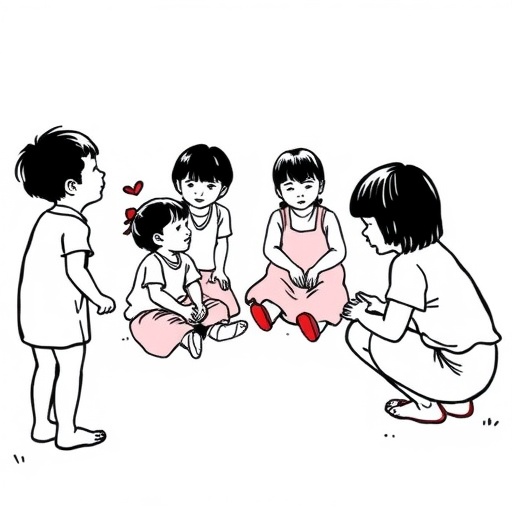In a groundbreaking study, researchers from a multidisciplinary team have taken a deep dive into the intricate psyche of BDSM interests, emphasizing the significant role of childhood experiences. This exploration sheds light on the complex relationship between perceived parenting, interparental dynamics, and the formative experiences that shape adult sexual preferences, particularly those related to BDSM. As society moves towards a more open dialogue about sexual orientation and preferences, understanding the origins of these interests becomes increasingly crucial.
At the core of this investigation lies the notion that childhood experiences can have profound implications on adult emotional and sexual landscapes. The researchers aimed to unravel how perceptions of parenting styles could influence an individual’s exploration of BDSM. By examining various parenting approaches—including authoritative, authoritarian, permissive, and uninvolved—the team uncovered that the type of environment children are raised in may strongly correlate with their adult sexual preferences.
The researchers further extended their inquiry into the realm of interparental dynamics, emphasizing the importance of the relationship between parents themselves. The study postulates that witnessing either supportive or contentious interactions between caregivers can shape a child’s understanding of relationships and intimacy. Children who observe healthy communication skills and mutual respect may develop a different set of values when it comes to their personal relationships. Conversely, those who witness conflict may gravitate towards BDSM as a way of processing their complex feelings about power and control in relationships.
Childhood traumatic experiences create another layer of complexity in this exploration. The study explores the impact of trauma—whether emotional, physical, or psychological—on shaping an individual’s sexual preferences. It postulates that engaging in BDSM might serve as a coping mechanism for those who have experienced trauma, allowing them to regain a sense of agency and control that might have been stripped away during their formative years.
Moreover, the research team utilized advanced methodologies to analyze the interplay between these factors. Through surveys that capture responses related to childhood experiences, parenting perceptions, and BDSM interests, they were able to paint a comprehensive picture of this intricate web. Statistical analyses were employed to identify significant correlations, thereby allowing the researchers to draw meaningful conclusions.
Importantly, the study addresses the stigma often associated with BDSM practices, advocating for a better understanding and acceptance of these preferences. By illuminating the underlying psychological mechanisms driving such interests, the researchers seek to foster a more inclusive dialogue surrounding sexual norms and interests. They emphasize that BDSM is not inherently pathological but can be a part of a healthy sexual expression when consensually practiced.
The findings also challenge common stereotypes that categorize BDSM practitioners as individuals with unresolved psychological issues. In fact, the research indicates that many individuals who identify with BDSM have well-developed emotional intelligence and are often able to articulate their boundaries and desires clearly. This nuanced understanding could shift public perceptions and facilitate more informed conversations about sexual diversity.
In contemplating the future implications of these findings, the researchers envision a society where sexual preferences are celebrated rather than stigmatized. They advocate for educational initiatives that explore sexual health and preferences in a manner that is inclusive and respectful. By introducing conversations around BDSM into sexual education curriculums, educators can prepare children and adolescents to understand the complexities of adult relationships better.
As discussions around consent, agency, and sexual health evolve, the study underscores the necessity of understanding the roots of various sexual interests. The researchers assert that those engaging in BDSM should not be judged or pathologized, but rather understood through the lens of their experiences. They hope that this work encourages further investigations into diverse sexual practices and promotes an open-minded approach to sexual preferences.
Furthermore, this research serves as a vital contribution to the ongoing discourse within psychology, sexology, and related fields. It invites other scholars to explore the untapped domains surrounding sexual orientation and practices, potentially leading to new therapeutic approaches for those grappling with understanding their sexual identity. The team’s findings could prove invaluable in developing frameworks for individuals seeking to explore their sexual desires in a safe and consensual manner.
Ultimately, the study’s exploration into BDSM interests emphasizes a crucial message: our childhood experiences matter. As we navigate the complexities of human sexuality, understanding the factors that shape our preferences allows for more compassion and acceptance toward individuals and their unique sexual narratives. In a world where everyone is encouraged to embrace their true selves, understanding the psychological aspects of these preferences becomes imperative for inclusion and acceptance.
In conclusion, the researchers’ work represents a monumental step towards demystifying BDSM interests and understanding the interplay of childhood experiences in shaping adult sexual behavior. By examining the connections between parenting styles, interparental dynamics, and childhood trauma, they illuminate the deep-seated factors influencing our desires. As society progresses toward more open and accepting dialogues about sexual orientation and preferences, studies like this one are critical in fostering understanding and compassion.
Subject of Research: The interplay of perceived parenting, interparental dynamics, and childhood traumatic experiences on BDSM interests.
Article Title: Exploring the Impact of Perceived Parenting, Interparental Dynamics, and Childhood Traumatic Experience on BDSM Interests.
Article References:
De Zeeuw–Jans, I.J., Andries, J., Coppens, V. et al. Exploring the Impact of Perceived Parenting, Interparental Dynamics, and Childhood Traumatic Experience on BDSM Interests.
Arch Sex Behav (2025). https://doi.org/10.1007/s10508-025-03248-6
Image Credits: AI Generated
DOI: https://doi.org/10.1007/s10508-025-03248-6
Keywords: BDSM, psychology, parenting, interparental dynamics, childhood trauma, sexual preferences.




